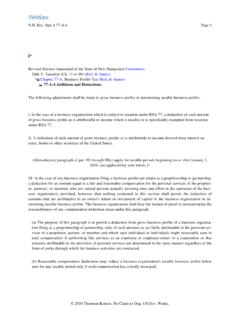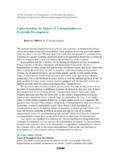Transcription of THE THERAPIST-CLIENT PRIVILEGE IN CHILD CUSTODY …
1 THE THERAPIST-CLIENT PRIVILEGE IN CHILD CUSTODY DISPUTES: Understanding the Berg Decision By: David P. Eby On October 18, 2005, the New Hampshire Supreme Court issued a ruling in In the Matter of Berg,1 where the Court addressed the issue of whether parents, in the context of CHILD CUSTODY disputes, have the right to obtain the records of their children s therapists. This article provides an overview of the Court s decision and its reasoning, attempts to decipher what the ruling means for therapists in New Hampshire, and provides practical pointers as to how therapists might comply with this recent decision.
2 The Facts of the Case Mr. and Mrs. Berg are the divorced parents of four children, ages 11-17. They share joint legal CUSTODY of their children with the mother having primary CUSTODY and the father having specific custodial time. After the divorce, some of the children stopped visiting the father pursuant to the visitation schedule, either because they refused or because the mother failed to make the children available. The children also reported some unspecified inappropriate conduct by the father. Accordingly, the mother arranged for individual counseling for the kids to address their relationship with their father and also to address the apparent resistance to visitation.
3 The father filed a motion seeking to hold the mother in contempt, alleging that the mother was interfering with his relationship with the children. The father also requested that the children s therapists produce records and notes from their therapy sessions, asserting that he would find evidence of the mother s 1 No. 2005-02 ( 10-18-2005) interference. The Court appointed a Guardian Ad Litem to represent the children s interests. The therapists refused to disclose their records and the Guardian Ad Litem ultimately filed a motion to seal the records. The trial court denied the motion to seal the therapists records, holding that the legal right of a custodial parent to access his children s records overrides the children s privacy rights, even if the father s assertion of his rights might objectively be looked upon as harmful to the children.
4 The New Hampshire Supreme Court reversed this decision and remanded the case for further proceedings. The Court s Decision In deciding the case, the Supreme Court could have ruled, in one extreme, that parents may always obtain therapy records of their children. Indeed, many parents might expect this right to their CHILD s records. On the other extreme, the Court could have ruled that the CHILD (the client), has the right to keep those records confidential in any situation by asserting the THERAPIST-CLIENT PRIVILEGE . The Court did neither. Instead, it took a middle approach.
5 Generally, the Court held that, in a CUSTODY dispute setting, it is the Court, and not the parents, Guardian Ad Litem, therapist , or even the CHILD (client), that has the authority to determine if private records must be produced. A trial court must make this determination based on a CHILD s best interest standard. In so ruling, the Supreme Court made it clear that neither the parents, nor the therapist , Guardian Ad Litem nor - 2 - children, have the exclusive right to waive or assert the PRIVILEGE . The THERAPIST-CLIENT PRIVILEGE The Court first held that a CHILD s privacy interest does not automatically yield to a parent s fundamental and constitutional right (under the State and Federal Constitutions) to raise his or her children.
6 The Court next determined that the THERAPIST-CLIENT PRIVILEGE in New Hampshire (RSA 330-A:32) includes minors in the definition of clients and the PRIVILEGE to keep those records confidential may be claimed by (a) the CHILD (client), (b) the CHILD s guardian, including a parent with CUSTODY rights, or (c) the CHILD s therapist . Although a parent has a right to assert or waive the PRIVILEGE on behalf of his/her CHILD , a parent does not have the exclusive right. The Court reasoned that an exclusive right to waive or assert the PRIVILEGE presumes the parents will act solely with the CHILD s interest in mind.
7 However, in CUSTODY cases, this is often not the case: ..when CUSTODY of the CHILD becomes the subject of a bitter contest between mother and father, the personal interests of the contestant in almost all cases, obliterate that which is in the best interest of the CHILD . It is at this point that it can be said the interests of both parents can become potentially, if not actually, adverse to the CHILD s interest. The Court also recognized the strong public policy underlying the THERAPIST-CLIENT PRIVILEGE , and that there is a great need for confidentiality in the THERAPIST-CLIENT relationship.
8 Allowing parents unfettered access to their children s therapy records under all circumstances may inhibit the CHILD from seeking or succeeding in treatment, or, even worse, result in substantial emotional harm to the CHILD from a forced disclosure. The Procedure to Determine Best Interest The Court ultimately held that the trial court has the authority and discretion to determine whether the waiver or assertion of the CHILD s THERAPIST-CLIENT PRIVILEGE is warranted and whether disclosure is in the CHILD s best interest. The Court did not provide a detailed procedure through which a court might come to this determination.
9 Instead, it merely indicated that a court must engage in fact-finding to determine the best interest of the CHILD , with particular emphasis on the children s ability to engage in open and productive therapeutic treatment. The assertion of the PRIVILEGE by a CHILD , parent, therapist , or Guardian Ad Litem, is not determinative, but great weight will be given to the CHILD s desire if that CHILD is sufficiently mature to make a sound judgment. CHILD s Maturity Under Berg, the trial court has the authority and discretion to determine whether the CHILD is sufficiently mature to make a sound judgment about the assertion or waiver of the PRIVILEGE .
10 The factors a trial court must consider include: (1) the age, intelligence and maturity of the CHILD , (2) the intensity with which he advances his preference, and (3) whether the preference is based on undesirable or improper influences. If the CHILD is sufficiently mature, a court may then give substantial weight to the CHILD s preference. - 3 - Guardian Ad Litem s Role: During the fact finding process, the trial court may allow the Guardian Ad Litem to review the records at issue so that the Guardian may make an informed decision as to whether assertion or waiver of the PRIVILEGE would be in the CHILD s best interest.










